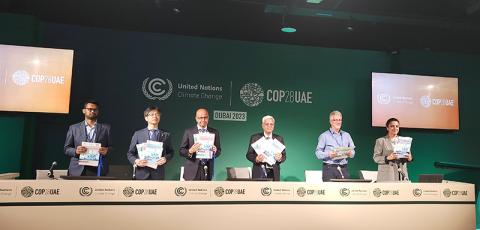Global Collaboration convene at COP28 to address climate challenges with a focus on sustainable cooling innovations

Dubai, December 4, 2023: The side event at the UNFCCC COP28, jointly organized by The Energy and Resources Institute (TERI), Natural Resources Defense Council (NRDC), and New Energy and Industrial Technology Development Organization (NEDO) brought together global stakeholders to discuss innovative solutions that address the complexities of climate change with a focus on heating and cooling challenges in emerging economies.
Joint event by TERI, NRDC, and NEDO Explores Solutions for Market Transformation, Featuring Discussions on Technology, Policies, and Collaborative Partnerships
Innovative technologies and policies related to the financing, Artificial Intelligence (AI), food security, thermal comfort, innovation, productivity, and more relevant topics related to cooling devices were discussed at the high-level session, ‘Global Collaboration for Innovation and Sustainable Cooling: Solutions for Market Transformation’.
Technological innovations in the refrigeration and air conditioning sector as well as passive cooling strategies were particularly highlighted. The three broad topics discussed over the two sessions were, innovative policy measures for enabling low-carbon cooling and investment, mobilizing financing for implementing low-carbon cooling solutions at scale, and role of partnerships and collaboration in advancing development and implementation of cooling innovations across countries.
In her opening remarks, Dr Vibha Dhawan, Director General, TERI, highlighted the imperative global journey toward adopting cooling practices and urged a collective effort to reshape the discourse surrounding cooling technologies. Emphasizing the principles of sustainability, innovation, and transformative market practices, she underscored the pivotal role of global collaboration. Articulating her vision towards an equitable planet, Dr Dhawan said, “Cooling has to be not only affordable, but also sustainable. Market can play an important role in the pursuit of sustainable cooling. It is the intersection of technological innovation with the ideals of sustainability that will define the future.”
Moderated by Mr Manish Bapna, President and CEO, NRDC, the first session was on ways of institutionalizing and scaling technology innovations for sustainable cooling through partnerships and collaborations. Before inviting the panelists for the discussion, Mr Bapna shared his concern that the emissions from cooling services are likely to triple in 2050, therefore the need to have policy push as well as technological push to address the challenge.
Mr Ali Zaidi, Assistant to the President and White House National Climate Advisor, United States, commenced his session by sharing insights into the success and lessons learned from the low-income heating assistance program. He highlighted the vulnerability of the low-income strata in society, stating, "In the USA, the cost of cooling will outpace the cost of heating. It will impact national and family budgets and strain the power grid. It is important to consider second-order and third-order implications," drawing attention to the need of making cooling systems accessible, efficient, and more affordable.
Mr Shinichi Kihara, Director General for International Policy on Carbon Neutrality, Ministry of Economy, Trade and Industry of Japan, spoke on Japan's green transition, which focuses on triple breakthroughs involving economic growth, energy security, and decarbonization. He emphasized a key focus on innovation in 14 priority fields, stating, "Japan is issuing climate transition bonds and hopes to mobilize public and private investment of about USD 1 trillion."
Mr David Sandalow, Integral Fellow at the Center on Global Energy Policy, Columbia University, discussed the significant role AI can play in climate mitigation, emphasizing its potential in contributing to the reduction of greenhouse emissions. Addressing barriers and risks, he provided a fresh perspective on how AI is poised to influence and shape the cooling sector.
The unveiling of policy briefs under the theme 'TERI-FCDO Policy Briefs on Climate Change and Health Systems Response for 7 Countries' took place ahead of the commencement of the event's second session which includes Bangladesh, Fiji, India, Indonesia, Philippines, Thailand and Vietnam.
Mr RR Rashmi, Distinguished Fellow, TERI, was the moderator for the technical session on examples of innovations in sustainable cooling Moderator.
Mr Michihiro Kishimoto, Environment Strategy Director at Hitachi, Ltd, presented Hitachi's IoT AC solution, EXIIDA. This solution utilizes consumer IoT data on cooling and refrigeration to create energy-efficient, cost-effective, high-safety, and comfortable technological systems. Emphasizing the importance of energy-efficient and accessible cooling for everyone, Mr. Noah Horowitz, Program Director at Clean Cooling Collaborative, expressed, "By 2050 there would be 3 billion ACs, therefore, the need for 5 times more efficient cooling technology at an affordable price."
Mr Abhas Jha, Practice Manager, Climate Change and Disaster Risk Management, South Asia Region, World Bank, shared his point of view, that if India continues with the current trajectory, the demand for air conditioning in India can grow to be as high as total energy demand of Africa. “The AC energy consumption for India from now to 2050 is going to multiply 9x. So cooling has to go beyond current solutions and be more inclusive,” added Mr Jha. He strongly advocated that the mindset of all stakeholders need to change and scale up R&D investment significantly to achieve desired results.
Centering on indigenous production within the Indian context, Ms Prima Madan, Senior Advocate for Cooling and Efficiency in the International Program, NRDC, conveyed that the future of cooling requires innovations at three distinct levels - component-level advancements, integration of alternative technologies, and the exploration of alternative approaches to cooling. Achieving these goals necessitates both financial backing and policy support.
Mr Shaurya Anand, Research Associate, TERI, delivered the concluding presentation of the session, emphasizing that sustainable cooling involves the amalgamation of technology, policies, and practices. He stated, "The future of cooling will be shaped by innovations in cooling methods, procurement policies, and behavioral change."
Mr Rashmi, concluded the session with, “some of the lessons learnt today will be pointers for our work in future.” The closing remarks by Mr Masatsugu Yoshioka, Executive Director, NEDO focused on the importance of multistakeholder collaborations at NEDO.
